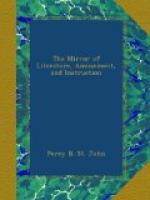to question: although, were we to do so, ours
would not he a solitary specimen of such ingratitude.[18]
On the day of our publishing the first portion,
we received a notice to desist from its continuance,—full
of the causticity of our friends on the other
side of the Tweed, and with whom, for the credit
of the south, we hope the measure originated.
We next resolved to suspend the conclusion; since
the
brutum fulmen became louder and louder
still, in an advertisement actively inserted in
the London newspapers. To make short of what is
and ought to be but a trifling affair, we have
abridged the whole story, and accordingly
now present the conclusion to our readers, though
certainly not in the promised state; how far we have
exculpated ourselves, is for our patrons to determine.—A
few words at parting, on the policy of the above
conduct. We need not enlarge upon the advantages
which publishers (and, to some extent, authors)
derive from portions of their works appearing
in periodical journals. The benefit is not reciprocal,
but largely on their side, if they consider how
many columns of advertisement duty they thereby
avoid. It is well known that the
first
edition of any work by such a master-spirit as
Sir Walter Scott is consumed in a few days by
the circulating libraries and reading societies
of the kingdom; but how many thousands would neither
have seen nor heard of his most successful works,
had not the
gusto been previously created by
the caducei of these literary Mercuries. Again,
sift any one of them, with higher pretensions
to originality than our economical sheet will
admit of, and you shall find it, in
quantity,
at least, to resemble Gratiano’s three grains.
But we are not inclined to quarrel with the scheme,
for with Johnson we say, “Quotation, sir
(Walter), is a good thing,” in the hope of hearing
our readers reply, “This fellow pecks up wit
as pigeons peas.”—ED.]
Some words passed after the departure, of Robin Oig,
between the bailiff, and Harry Wakefield, who was
now not indisposed to defend Robin Oig’s reputation.
But Dame Heskett prevented this second quarrel by her
peremptory interference. The conversation turned
on the expected markets, and the prices from different
parts of Scotland and England, and Harry Wakefield
found a chap for a part of his drove, and at a considerable
profit; an event more than sufficient to blot out all
remembrances of the past scuffle. But there remained
one from whose mind that recollection could not have
been wiped by possession of every head of cattle betwixt
Esk and Eden.
This was Robin Oig M’Combich.—“That
I should have had no weapon,” he said, “and
for the first time in my life!—Blighted
be the tongue that bids the Highlander part with the
dirk—the dirk—ha! the English
blood!—My muhme’s word—when
did her word fall to the ground?”




